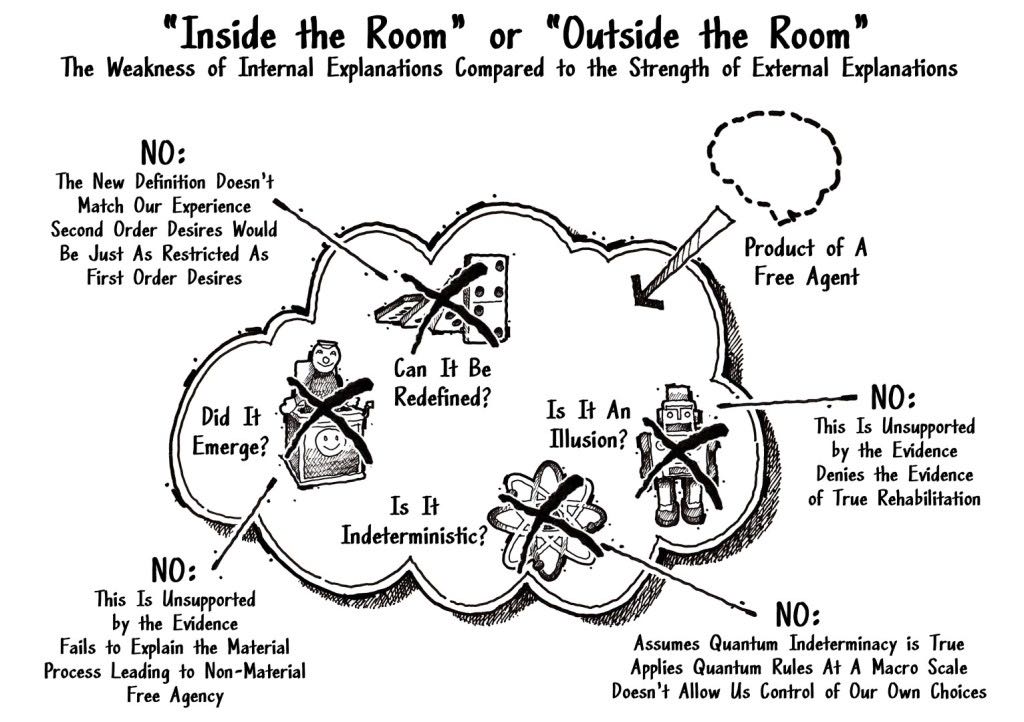
University of California professor of Psychology, Michael Gazzaniga cites the analogy of automobile car parts: “If you look at an isolated car part, such as a cam shaft, you cannot predict that the freeway will be full of traffic at 5:15 pm, Monday through Friday. In fact, you could not even predict the phenomenon of traffic would ever occur if you just looked at a brake pad . . . A new set of laws emerge that aren’t predicted from the parts alone. The same holds true for brains . . . When more than one brain interacts, new and unpredictable things begin to emerge, establishing a new set of rules. Two of the properties that are acquired in this new set of rules that weren’t previously present are responsibility and freedom.”
While this may seem reasonable by way of analogy, a closer examination exposes the weakness of this explanation:
This Explanation Fails to Address the Phenomenon of Free Will
Physical analogies such as the one offered by professor Gazzaniga fail to explain the emergence of consciousness or free will. Automobile parts (even when assembled in the form of automobiles) are still unable to consider or experience the phenomena we call “traffic.” Car parts aren’t even the cause of traffic in the first place. Instead, humans with minds cause traffic given our free choices related to the way we use automobiles. Traffic isn’t an emergent property of automobile parts, it’s a consequence of human free agency. Analogies such as these only highlight the role of our free will and the difference between physical systems and human free agency. As David Chalmers observes, “No explanation given wholly on physical terms can ever account for the emergence of conscious experience.”
This Explanation Fails to Explain How Brains “Interact”
To say free will emerges “when more than one brain interacts” fails to explain how these material organs can physically interact to accomplish this goal. The interaction we experience between one another as thinking human beings requires non-material consciousness and free will before the interaction can take place. If materialism is true, how do material brains physically interact to produce non-physical consciousness and free will?
This Explanation Acknowledges the Existence of Non-material Properties without Explaining Their Origin
Even Gazzaniga admits emergence as an explanation for consciousness or free will has been largely dismissed by neuroscientists. Materialist neuroscience continues to reject dualism and has labored diligently over the past century to demonstrate the sole existence of the brain (while rejecting the mind as illusory). When scientists attribute free will or consciousness to “emergence” without explaining precisely the physical process responsible for the transition, they might as well say, “We have no idea how conscious free will appears, but somehow it just does.” This sort of explanation allows for free will, but fails to account for it from the materials available “inside the room”. Even Michael Gazzaniga recognizes the problem: “emergence is mightily resisted by many neuroscientists, who sit grimly in the corner and continue to shake their heads. They have been celebrating that they have finally dislodged the homunculus out of the brain. They have defeated dualism. All the ghosts in the machine have been banished and they, as sure as shootin’, are not letting any back in. They are afraid that to put emergence in the equation may imply that something other than the brain is doing the work and that would let the ghost back into the deterministic machine that the brain is.” As a result, it acknowledges the necessity of an extra-natural, external source for consciousness.

Illustration from God’s Crime Scene
There is simply no evidence to support the mysterious concept of “emergence”. For this reason, emergence has been largely dismissed by neuroscientists. Emergence (as an explanation for free will) concedes the dualistic nature of the mind and the brain (one emerges from the other), but tries to explain it as a consequence of the laws of physics and chemistry within the material universe. This is also logically inconsistent, however, since non-material explanations are not available unless we are willing to step “outside” the parameters of a material universe. The best explanation for “free will” is simply the existence of a creative Free Agent outside the limits of the physical universe who has created free humans in His image. This short blog post is a limited excerpt from God’s Crime Scene. For more information, please refer to Chapter Six – Free Will or Full Wiring: Are Real Choices Even Possible? The best explanation for “free will” is simply the existence of a creative Free Agent outside the limits of the physical universe who has created free humans in His image. Share on X

J. Warner Wallace is a Dateline featured Cold-Case Detective, Senior Fellow at the Colson Center for Christian Worldview, Adj. Professor of Christian Apologetics at Talbot School of Theology, Biola University, author of Cold-Case Christianity, God’s Crime Scene, and Forensic Faith, and creator of the Case Makers Academy for kids.
Subscribe to J. Warner’s Daily Email
J. Warner Wallace is a Dateline featured cold-case homicide detective, popular national speaker and best-selling author. He continues to consult on cold-case investigations while serving as a Senior Fellow at the Colson Center for Christian Worldview. He is also an Adj. Professor of Christian Apologetics at Talbot School of Theology, Biola University, and a faculty member at Summit Ministries. He holds a BA in Design (from CSULB), an MA in Architecture (from UCLA), and an MA in Theological Studies (from Gateway Seminary).
































